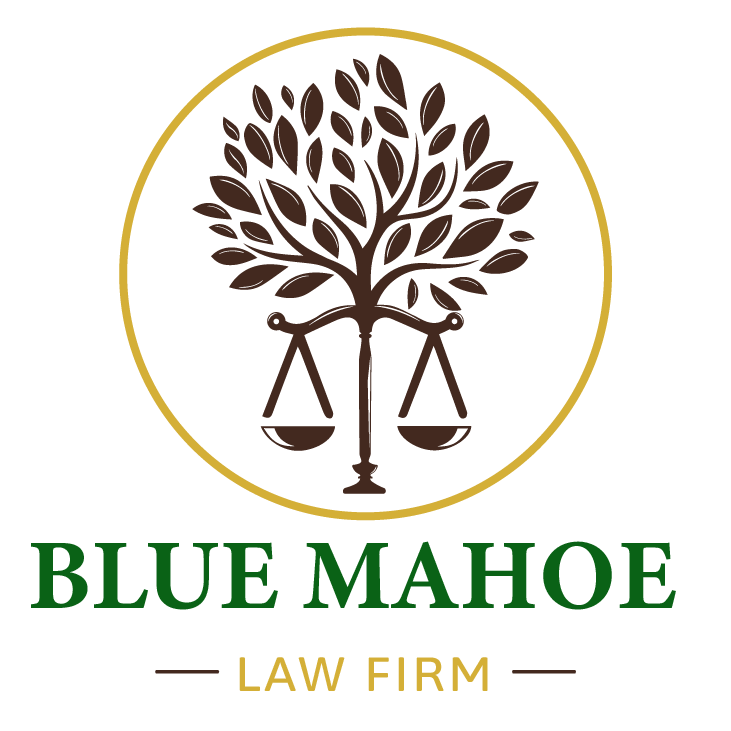April 10, 2025
The portrait of the "typical" family has evolved significantly. Today, many families in South Florida and across the nation are beautifully blended, formed through remarriage and bringing together children from previous relationships. While these unions create vibrant new family dynamics, they also introduce unique complexities, particularly when it comes to planning for the future. Estate planning, often perceived as complex even for traditional families, requires even more meticulous attention and specialized knowledge for blended families. Failing to address these complexities proactively can unfortunately lead to confusion, unintended consequences, conflict among loved ones, and potentially costly legal battles down the road. This is where experienced, compassionate legal guidance becomes invaluable. At Blue Mahoe Law , we understand the intricate emotional and legal tapestry of blended families. Led by Ashleigh McKenzie , recognized as one of South Florida's top estate planning lawyers and the firm's Founding Attorney, we specialize in crafting bespoke estate plans that honour your unique family structure and ensure your wishes are carried out precisely. Serving the diverse communities of South Florida, including the vibrant Caribbean diaspora, we provide expert legal services not only in estate planning but also in probate, business law, and intellectual property. This post offers guidance on navigating the specific challenges of estate planning for blended families in our region. What Exactly is a Blended Family in Estate Planning Terms? A blended family typically refers to a family unit where one or both spouses have children from a previous relationship. This can include: Couples where one partner has children and the other does not. Couples where both partners have children from prior relationships. Families with "his, hers, and ours" children (children from previous relationships plus children from the current marriage). Legally, the key distinction often lies in the relationship between the stepparent and stepchild. Unlike biological or adopted children, stepchildren generally do not have automatic inheritance rights under Florida's intestacy laws (the laws that apply when someone dies without a valid will). This makes deliberate, clear estate planning absolutely critical. Why Standard Estate Plans Often Fall Short for Blended Families The default rules of inheritance are simply not designed for the nuances of blended families. If you pass away without a will (intestate), Florida law dictates how your assets are distributed. While designed to be fair in a traditional context, these rules can lead to outcomes completely contrary to your intentions in a blended family situation: Potential Disinheritance of Children: Depending on the structure, your surviving spouse might inherit a significant portion, or even all, of your estate, potentially leaving children from a previous marriage with little or nothing, especially if the surviving spouse later creates their own plan favouring only their biological children. Unintended Consequences for Stepchildren: Unless explicitly named in a will or trust, stepchildren typically receive nothing under intestacy laws. If you wish to provide for them, you must specify this in your legal documents. Conflict Between Surviving Spouse and Children: Tensions can easily arise between a surviving spouse and children from the deceased's prior marriage over asset distribution, control of assets, or differing interpretations of vague wishes. Asset Protection Issues: Assets intended for specific children could be vulnerable to the surviving spouse's creditors or future marital claims if not structured correctly. A well-crafted estate plan, designed specifically for your blended family, replaces these default rules with your explicit instructions, providing clarity, protecting loved ones, and preserving family harmony. Key Challenges and Considerations for Blended Families in South Florida Navigating estate planning for blended families involves addressing several sensitive areas: Balancing Interests: How do you provide adequately for your current spouse while ensuring your children from a previous marriage are also taken care of, especially after the surviving spouse passes away? Defining "Issue" or "Descendants": Legal documents often use terms like "issue" or "descendants." It's crucial to clearly define whether this includes only biological/adopted children or also stepchildren, leaving no room for interpretation. Fairness vs. Equality: Does "fair" mean treating all children (biological and stepchildren) equally, or does it mean distributing assets based on individual needs, contributions, or other factors? Your plan must reflect your definition of fairness. Asset Origin: Assets brought into the marriage versus assets acquired jointly during the marriage may need different treatment. Prenuptial or postnuptial agreements can play a significant role here and must be coordinated with the estate plan. Guardianship for Minor Children: If you have minor children, designating a guardian is critical. In a blended family, this requires careful consideration, especially regarding the role of stepparents versus surviving biological parents or other relatives. Incapacity Planning: Who makes financial and healthcare decisions if you become incapacitated? Will it be your current spouse, an adult child from a previous marriage, or someone else? Potential conflicts must be anticipated and addressed through Powers of Attorney and Healthcare Directives. Essential Estate Planning Tools and Strategies Ashleigh McKenzie and the team at Blue Mahoe Law utilize a range of sophisticated tools to address the unique needs of blended families: The Last Will and Testament: The cornerstone of many plans, a Will allows you to nominate guardians for minor children and specify who inherits your probate assets. For blended families, the Will must be meticulously drafted to clearly name all intended beneficiaries (including stepchildren, if desired) and the specific assets or proportions they should receive. However, a Will alone often isn't sufficient due to probate requirements and potential limitations. Trusts – The Powerhouse for Blended Families: Trusts offer significantly more flexibility, control, and privacy than Wills alone. They avoid probate for assets held within the trust and can manage distributions over time under specific conditions. Key types include: Revocable Living Trust (RLT): You maintain control during your lifetime, and assets pass outside of probate according to the trust's terms upon your death. This is highly effective for managing complex distributions. Qualified Terminable Interest Property (QTIP) Trust: This is often a cornerstone strategy for blended families. A QTIP trust allows you to provide for your surviving spouse for their lifetime (e.g., they receive income from the trust assets). Upon the surviving spouse's death, the remaining trust assets pass to beneficiaries you designated – typically your children from a previous marriage. This ensures your spouse is cared for while safeguarding the inheritance for your children. Irrevocable Trusts: These can be used for specific goals like asset protection, tax planning, or providing for beneficiaries with special needs (Special Needs Trust). An Irrevocable Life Insurance Trust (ILIT) can hold life insurance policies outside your taxable estate, providing liquidity for beneficiaries. Separate Trusts: Sometimes, creating separate trusts for children from different marriages can provide clarity and minimize potential conflict. Prenuptial and Postnuptial Agreements: These legal contracts define property rights and financial expectations before or during a marriage. They are crucial for blended families to clarify what constitutes separate versus marital property, protecting assets brought into the marriage and setting expectations regarding inheritance rights, particularly spousal elective share rights under Florida law. It's vital these agreements are consistent with your overall estate plan. Beneficiary Designations: Assets like life insurance policies, retirement accounts (IRAs, 401(k)s), and annuities pass directly to the named beneficiaries, bypassing your Will or Trust . It is absolutely critical to review and update these designations regularly, especially after remarriage, divorce, or the birth/adoption of children. Outdated designations are a common and devastating mistake in blended family estate planning. Titling of Assets: How you own property (e.g., Joint Tenancy with Right of Survivorship vs. Tenants in Common) has direct inheritance implications. Joint tenancy automatically passes the asset to the surviving joint owner, overriding your Will. This might be desirable for some assets with your spouse, but disastrous if intended for children from a prior marriage. Careful asset titling is essential. Powers of Attorney and Healthcare Directives: Durable Power of Attorney (Financial): Designates an agent to manage your finances if you become incapacitated. In a blended family, carefully consider whether your spouse or an adult child (or a neutral third party) is the most appropriate choice to avoid conflict. Designation of Health Care Surrogate & Living Will: Appoints an agent for healthcare decisions and outlines your wishes regarding end-of-life care. Again, thoughtful consideration of family dynamics is crucial when selecting your surrogate. The Importance of Open Communication (and Clear Documentation) While legal documents are paramount, having open conversations with your spouse about your estate planning goals and intentions can sometimes ease tensions. Discussing why you're structuring things a certain way (e.g., using a QTIP trust to provide for both spouse and children) can foster understanding. However, communication alone isn't enough and isn't always appropriate or possible. Your legally binding documents – the Will, trusts, beneficiary designations – are what ultimately matter. They must be unambiguous and professionally drafted to withstand scrutiny and ensure your wishes are legally enforceable. Serving South Florida and the Caribbean Diaspora Blue Mahoe Law is deeply committed to serving all families in South Florida, with a particular understanding of the cultural nuances and specific needs of the Caribbean diaspora. Ashleigh McKenzie brings not only top-tier legal expertise but also cultural sensitivity to the planning process, ensuring clients feel understood and comfortable discussing sensitive family matters. We recognize that family structures and financial priorities can vary, and we tailor our approach accordingly. Why Choose Ashleigh McKenzie and Blue Mahoe Law? Navigating the complexities of blended family estate planning requires more than just generic legal documents. It demands: Specialized Knowledge: Understanding the interplay of family law, probate law, and trust law specific to blended families. Strategic Thinking: Utilizing tools like QTIP trusts effectively to balance competing interests. Attention to Detail: Ensuring precise language in all documents to avoid ambiguity. Empathy and Discretion: Handling sensitive family dynamics with care and confidentiality. Local Expertise: Deep familiarity with Florida law and the South Florida community. Ashleigh McKenzie embodies these qualities. Her recognition as a top estate planning lawyer in South Florida is built on a foundation of providing exceptional, personalized legal counsel that truly addresses the unique challenges faced by modern families. At Blue Mahoe Law, we don't just draft documents; we build relationships and provide peace of mind. Take the First Step Towards Securing Your Family's Future If you are part of a blended family in South Florida, proactive estate planning isn't just advisable – it's essential. Putting off planning, or relying on generic online forms or inexperienced counsel, risks leaving a legacy of confusion and conflict instead of security and harmony. Protect your loved ones, honour your intentions, and navigate the future with confidence. Contact Ashleigh McKenzie and the experienced team at Blue Mahoe Law today to schedule a consultation. Let us help you craft a comprehensive estate plan tailored to the unique beauty and complexity of your blended family. Disclaimer: This blog post is for informational purposes only and does not constitute legal advice. Estate planning laws are complex and vary based on individual circumstances. You should consult with a qualified estate planning attorney regarding your specific situation. Contact Blue Mahoe Law for personalized legal counsel.



